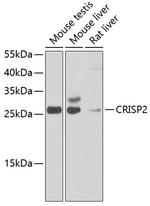Search Thermo Fisher Scientific
FIGURE: 1 / 1
CRISP2 Antibody (PA5-109590) in WB

Product Details
PA5-109590
Species Reactivity
Host/Isotype
Class
Type
Immunogen
Conjugate
Form
Concentration
Purification
Storage buffer
Contains
Storage conditions
Shipping conditions
RRID
Product Specific Information
Immunogen sequence: KDPAFTALLT TQLQVQREIV NKHNELRKAV SPPASNMLKM EWSREVTTNA QRWANKCTLQ HSDPEDRKTS TRCGENLYMS SDPTSWSSAI QSWYDEILDF VYGVGPKSPN AVVGHYTQLV WYSTYQVGCG IAYCPNQDSL KYYYVCQYCP AGNNMNRKNT PYQQGTPCAG CPDDCDKGLC TNSCQYQDLL SNCDSLKNTA GCEHELLKEK CKATCLCENK IY
Target Information
The cysteine-rich secretory proteins (CRISP) family is a group of four proteins that are strongly expressed in the male reproductive tract and have been implicated in having roles in male fertility. CRISP2, also known as TPX1, has been implicated in the adhesion between spermatids and Sertoli cells, and with CRISP1, is thought to be involved in sperm-egg fusion. CRISP2 has been shown to regulate the Ca2+ influx through ryanodine receptors (RYR) and may influence the acrosome reaction or sperm motility. CRISP2 has also been shown to bind to the mitogen-activated protein kinase kinase kinase 11 (MAP3K11) and localizes to the developing acrosome, suggesting this CRISP2-MAP3K11 complex may have a role in acrosome development.
For Research Use Only. Not for use in diagnostic procedures. Not for resale without express authorization.
References (0)
Bioinformatics
Protein Aliases: CRISP-2; Cysteine-rich secretory protein 2; cysteine-rich secretory protein 2-like; MGC111136; OTTHUMP00000016589; testis specific gene 1; testis specific protein 1; Testis-specific protein TPX-1
Gene Aliases: CRISP-2; Crisp2; Crisp2l; GAPDL5; Tpx-1; Tpx1
UniProt ID: (Mouse) P16563
Entrez Gene ID: (Mouse) 22024, (Rat) 360445

Performance Guarantee
If an Invitrogen™ antibody doesn't perform as described on our website or datasheet,we'll replace the product at no cost to you, or provide you with a credit for a future purchase.*
Learn more
We're here to help
Get expert recommendations for common problems or connect directly with an on staff expert for technical assistance related to applications, equipment and general product use.
Contact tech support
